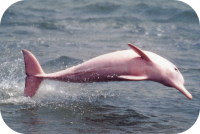|
Amazon River Dolphins are freshwater aquatic
mammals.
|
Amazon River Dolphin
Classification:
Kingdom: Animalia
Phylum: Chordata
Class: Mammalia
Order: Cetacea
Family: Iniidae
Genus: Inia
Species: Geoffrensis
|
Other Names: Boto, Bouto, Pink Dolphin,
Pink River Dolphin, Befuo, Boto Vermelho, Boto
Cor-de-rosa,
Size: Amazon River Dolphins are 5.9 to
8 feet in length. They weigh approximately 217
lbs. Male Boto Dolphins are typically larger than
females.
Habitat: Amazon River dolphins are found
in the Amazon River and the Orinoco River systems.
These rivers run through Brazil, Bolivia, Ecuador,
Venezuela, Colombia, Guyana and Peru.
|

Amazon River Dolphin
Conservation Status: on Endangered List
by the IUCN
|
Diet: Amazon River Dolphins feed on crustaceans, crabs,
small turtles, catfish, piranha, shrimp, and other fish.
Senses: Unlike many other dolphins Amazon River
Dolphins are thought to have a well developed sense
of hearing. Though the Amazon River Dolphin's eyes are
small it has excellent vision, both in and out of water.
Description: Amazon River Dolphins are found
in all shades of pink, from a dull gray-pink, to rto
a bright flamingo pink . The color variation is a result
of the water clarity; typically the darker thewater,
the pinker the dolphin. Sunlight will cause the dolphin
to lose their pink pigmentation. The cervical vertabrae
of the Amazon River Dolphin are unfused which allows
them to move their head from side to side, at a 180
degrees. They have a very long narrow beak, with whiskers
that are used to locate food in the mud.
Amazon River Dolphin have a ridge along its back rather
than a dorsal fin and though it is fat, heavy body is
surprisingly flexible. They have Paddle-like flippers
which move in a circular motion, they have a surprising
amount of manuevarbility to navigate around under water
tree roots during floods.
| Communication:
Amazon River Dolphins use low frequency sounds to
communicate. |
Did You Know?
Amazon River Dolphins
are the best known river dolphin.
|
|
Hunting: Amazon River Dolphins use echolacation a
form of built in radar to locate their prey.
Gestation: Amazon River Dolphins carry their
young for 9 to 12 months. Females give birth every 4.5
to 5 years.
Birth: Amazon River Dolphin calves are 32 inches
long at birth and they weigh approximately 15 pounds.
Calves: Amazon River Dolphin calves typically
stay with their mothers for the first 2.5 years of their
life.
Sexual Maturity: Male Boto Dolphins sexually
mature at 7 feet and the females mature at about 5.5
feet, this typically occurs between the ages of 6 and
10.
Life Span: Amazon River Dolphins have a typical
lifespan of 30 years or more. Their numbers have been
diminshed due to pollution, habitat degradation and damage
to their natural environment.
Unusual: Amazon River Dolphins swim at approximately
9 mph. They will swim up to 60 miles per day.
|

